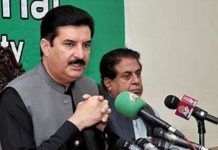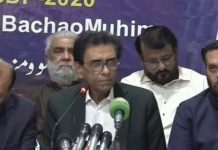DNA
ISLAMABAD: Jonathan Goodluck, the head of the Common Wealth election observers mission has said except a few incidents the elections process in Pakistan went smoothly.
Addressing a news conference in Islamabad he said, he would like to express appreciation to you all for attending this press conference, in which I will deliver the preliminary findings of the Commonwealth Observer Group (COG).
May I begin by conveying, on behalf of the Group, our appreciation for the invitation extended to observe these General Elections, and for all the arrangements that have been made to facilitate the work of the COG by the Election Commission of Pakistan (ECP) and the Government of Pakistan. Pakistan is a founding and valued member of the Commonwealth family and one of the world’s largest democracies. We are aware of the importance of these elections for the people of Pakistan.
The Group undertook its work on the basis of the principles of impartiality, non interference, and independence, as required by the Declaration of Principles for International Election Observation, and in accordance with the Revised Guidelines on Commonwealth Election Observation, which was adopted by all Commonwealth member countries in 2018.
The mandate of a Commonwealth Observer Group is to consider the various factors contributing to, or affecting the credibility of, the electoral process as a whole, and determine in our own judgement whether the elections have been conducted according to the standards for democratic elections to which a member state has committed itself.
This includes an analysis of the pre election environment as well as polling day procedures. We are issuing our preliminary statement today, while aware that the electoral process is yet to be formally concluded.
Our final report, setting out our full findings on the entire electoral process and our detailed recommendations, will be submitted to the Commonwealth Secretary-General before being shared with the Government of Pakistan and then made publicly available. A group consisting of eminent individuals from across the Commonwealth was constituted by the Secretary-General, the Rt. Hon.
Patricia Scotland KC. On our arrival in Pakistan, the Group received briefings from a variety of local stakeholders from 2 to 5 February 2024. We met with the ECP, the police, political parties, civil society, media representatives, Commonwealth High Commissioners, and citizen observers. I also met the Caretaker Prime Minister, Minister of Interior, and the Chief of Army Staff of Pakistan. Our observers were deployed to various areas on 6 February 2024, covering Islamabad, Rawalpindi, Lahore, Multan, Faisalabad, Karachi, Hyderabad and Abbottabad.
While on deployment, we observed ECP preparations. In advance of election day, we visited a number of polling stations in different constituencies, and met with provincial electoral officials, representatives of political parties and civil society, the police and other stakeholders in their respective locations, to gain a broader picture of the electoral process on the ground. Our preliminary findings will be shared in the following manner. First, we will provide our key findings on the pre-election environment. Second, we will focus on our observations on Election Day. Finally, we will share brief reflections on the post election environment. This approach is in line with our mandate, as underscored in the arrival statement we issued on 4 February 2024.
I will now turn to the initial observations of the Commonwealth Observer Group. Pre-election environment Electoral Preparations We wish to commend the ECP and its staff for the substantial amount of work and the detailed logistical preparations they made for the elections. While noting some delays involved in proceeding with these General Elections, we also acknowledge the significant challenges in organising an election involving around 128 million registered voters, a marked increase from the approximately 106 million registered voters in 2018. We recognise the security challenges faced by the ECP. We note that, in the lead up to Election Day, there were attacks which resulted in the unfortunate loss of lives. Recalling the statement I issued on 7 February, I wish to reiterate my condemnation of these attacks.
I offer my sincere condolences to the people of Pakistan, especially the families of the victims, and wish a quick recovery to those injured. I commend all polling and security officials for ensuring the safety and security of polling stations and enabling the people of Pakistan to exercise their right to vote. We note the additional challenges posed by adverse weather conditions. We commend voters, polling officials, and others who braved the cold and even snowbound conditions in some areas on Election Day. We are cognisant of the effects of the devastating floods in 2022, when many voters lost their computerised national identity cards (CNICs). We are aware of reports that some voters could not secure new CNICs in time to cast their ballot on Election Day.
We also note that some polling stations were relocated a considerable distance away from their original locations, to which some voters may not have been able to travel. We encourage the National Database and Registration Authority (NADRA), the ECP, and development agencies to continue to address such challenges.
Legal Environment and Election Administration It is noted that the 2024 General Elections took place against the background of a substantially reformed and improved legal framework, initiated prior to the previous general elections in 2018. It is hoped that this reform process will continue to be 2 met in accordance with the Constitution of Pakistan, both in letter and spirit, and the values enshrined in the Commonwealth Charter. Where the Group identifies areas that the legal framework could benefit from refining, we will make recommendations in our final report, in keeping with the Commonwealth’s whole-of-election-cycle approach. Participation and Inclusion It is commendable that the national gender gap in registered voters was reduced from almost 13 percent in 2013 to 7.7 percent. We note also that 60 seats in the National Assembly are reserved for women.
Notwithstanding these gains, the Group received reports that some political parties did not meet the requirement of having at least five percent women candidates on their party lists. We note that more than 5,000 candidates stood for election to the National Assembly in these General Elections, of whom approximately only six percent were women. We note reports of some communities that sought to deter women from campaigning and voting.
We also note that there remain some barriers to the full participation of minority communities in Pakistan. Noting that Pakistan currently has the highest proportion of young people in its history, we observed and commend the active participation by youth in these elections, especially in campaigns and on social media. The Campaign We note the importance of a legal and administrative environment which facilitates the right of citizens to run for office and to vote for their chosen candidates. The Group received reports of incidents of intimidation and even violence against candidates, members of the media and other citizens.
We also received reports of arrests and detentions, especially of supporters and members of a main political party. We note the impact of legal decisions on the ability of some candidates to run for office in the days leading up to Election Day, including a decision which disallowed the party symbol of a main political party. Stakeholders expressed concerns about the impact of this decision, insofar as it curtailed the right of voters to exercise their franchise, particularly illiterate voters.
They also conveyed concerns that members of the affected party would not be eligible for reserved seats. We observed that candidates conducted traditional and social media campaigns. We received reports of some candidates’ campaigns being disrupted, thus affecting their right of peaceful assembly and the right to participate in the electoral process. We note there were instances where the prohibition on campaigning during the 48 hour ‘silence period’ was violated.
Media 3 We received reports that state media coverage was more favourable to some candidates and parties than to others. We note with concern certain media laws and their application, as well as of pressure faced by some members of the media in regard to their coverage of the election, including for self-censorship and in regard to their safety. We commend those members of the media who withstood such pressures. We welcome the various fact-checking efforts by traditional media platforms and fact-checking organisations to mitigate the high incidence of disinformation, fake news and hate speech. We encourage such efforts to continue.
We note with concern the restrictions placed on internet access and in particular, the shutdown of internet and mobile phone services on Election Day, which curtailed freedom of speech, ease of communication as well as other political rights. Communication with electoral stakeholders We were informed about the implementation of codes of conduct for political parties and the media in these elections. We note calls for more stakeholder engagement in the development of these codes. We will reflect further on this in our final report and recommendations that can enhance engagement and transparency in this regard. Election Management System (EMS) We are encouraged by the efforts of the ECP in seeking to improve election management processes through the introduction of an Election Management System (EMS). We note, however, that the EMS could not operate as intended on Election Day. I will comment on this shortly, in our Election Day observations. Election Day observations Eve of Polling During our deployment, the Group observed preparations by local election officials, including the distribution of sensitive materials and setting up of polling stations. We observed that they were generally well-prepared and we wish to commend the ECP, their staff, and temporary workforce of over one million personnel. Polling environment On 8 February, our observers visited polling stations to observe the opening, voting, counting and collation of results, following which they returned to Islamabad for debriefing and preparation of our preliminary report. As Chairperson, on Election Day, I also had the opportunity to visit the Election Monitoring Control Centre at the ECP and the Election Security Control Centre. While we received reports of some incidents on Election Day, which we will consider further in our final report, voting took place in a largely peaceful environment. 4 Pre-poll procedures and opening of polls We observed that pre-polling procedures were largely followed and that polling stations opened on time. Some stations experienced minor delays in opening. For the most part, they were equipped with requisite polling staff and materials. Voter turnout The Group observed that the rate of voter turnout increased significantly as the day progressed. The Group will comment further on this issue in its final report. Role of polling staff and polling procedures Polling staff were, for the most part, professional and diligent in carrying out their duties. We observed, however, that in some instances procedures were not adhered to. The processing of voters was slow in some instances. Participation and Inclusion We observed the significant presence of youth, including young women, as ECP officials and polling agents. We commend the presence of dedicated polling stations for women to facilitate the participation of female voters. We observed that there were many female polling staff and polling agents, and that women police officers were also present among the security at some polling stations. We observed many persons with disabilities (PWDs) voting on Election Day. We commend all polling staff and security personnel for being proactive in assisting and granting priority to PWDs, the elderly, pregnant and nursing mothers, although we noted that such assistance was not uniform. We observed some polling stations with concrete ramps for PWDs, but also noted the absence of ramps and other means of access at many polling stations. We also noted a number of polling stations that were located above the ground floor. We encourage the ECP to continue their important work towards fostering the inclusion of PWDs in the electoral process, including through increased voter education on postal ballots. Role of party agents While party or candidates’ agents were present in most polling stations observed, there were isolated cases of agents not being accommodated in some polling stations during the voting process and, in addition, they could not properly observe the count. Security Security was highly visible at all polling locations that the Group visited. Security officials we observed were professional and carried out their duties diligently. 5 Secrecy of the ballot The layout of polling stations generally ensured that the secrecy of the ballot for voters was assured, although the Group observed that the location of CCTV cameras in some polling stations could have compromised the secrecy. Close and Count Polling stations generally closed on time, and those who were within the premises at the stipulated closing time of 1700 hrs were accorded the right to cast their ballot. The count at polling stations we observed was generally managed efficiently by polling staff. Results Management As during previous general elections, we noted the continued efforts at promoting transparency, with the display of the signed Form 45 outside each polling station after counting concluded. We note that these forms were due to be sent via the mobile phone application, but the shutdown of internet and mobile coverage compelled presiding officers to rely solely on manual transmission of the forms. We received reports that this adversely impacted the processing of results. We will reflect on this further in our final report. Conclusion We congratulate the people of Pakistan for their patience and determination throughout the electoral process. Notwithstanding the challenges noted, citizens turned out to exercise their right to vote on Election Day. We also commend all polling staff, political parties, candidates, their agents, and the security agencies for their respective roles during this electoral process. While the results process is being finalised, I call on all citizens to continue to exercise patience and restraint. It is our hope that the process will be concluded effectively and that it will reflect the will of the people. I speak from experience in calling for candidates to be magnanimous in victory, and gracious in defeat. We call on all those with grievances to address disputes through prescribed election dispute resolution mechanisms. Elections are a defining moment in every democracy, and each election offers an opportunity to take forward the positive gains made in the previous cycle. We once again commend the efforts made to build on the improved legal framework from previous elections. We encourage these efforts to continue, and reaffirm the Commonwealth’s continuing commitment to being part of Pakistan’s post-election journey. I thank you.

















